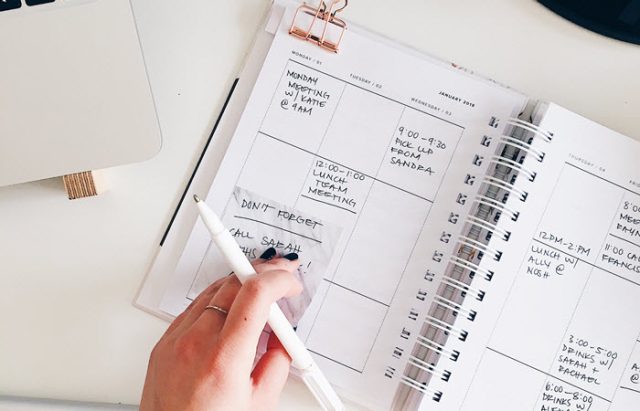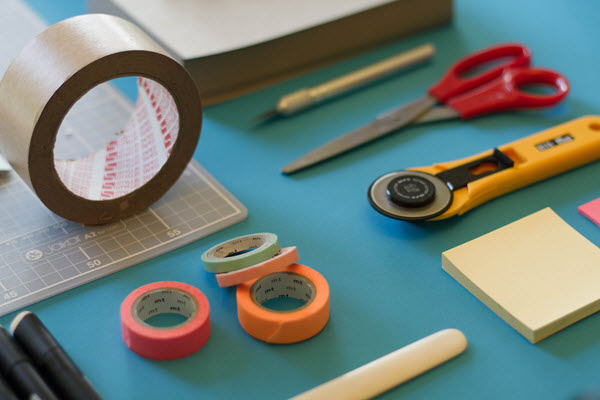7 Super Effective Tips to Meet Deadlines Without Going Mad
By Estelle Liotard
May 10, 2019 • Fact checked by Dumb Little Man

When our workdays or school days start becoming more and more demanding, we tend to lose control over our time and schedule. We try to keep up and have everything done in time, but it keeps getting harder and harder.
This is because we haven’t developed the right time management and organizational skills. And the lack of such skills makes meeting deadlines seems like an impossible task.
Luckily for you, we’ve got you covered. Take a look at these 7 super effective tips on how to meet deadlines.
Write It All Down on a Timetable

The number one and most important step of a good project organization is definitely planning. You have to learn how to properly plan your workdays and its most important aspects.
In order for you to be able to organize each workday, you have to know everything that you’re expected to do.
This is impossible without a planner or a timetable.
Yes, you can try writing down your assignments on random pieces of paper or in your phone’s notes. But, the best way to keep everything under control is to write it all down in one planner you’ll use for all of your projects.
Make sure to do the following:
– Buy a planner.
– Carry it everywhere you go.
– Write down everything you need to do.
– Write down specific deadlines.
Once you have all the right information, you’ll be able to organize your day better and take your schedule into your own hands.
Estimate the Time for Project Completion
With each new project that comes, you need to estimate how much time you need to complete it. This is highly important because you won’t be able to organize your work days properly otherwise.
Here’s how you should handle it:
– For each new assignment or project, estimate how much time you need to complete it.
– Make sure you leave time for bumps on the road.
– Always try leaving an extra day for unplanned circumstances.
-If you’re not able to estimate yourself, talk to your colleagues or peers for advice.
Once you decide on the amount of time you need for project completion, set a completion date. As much as possible, don’t make the deadline date your completion date.
As you write the completion date in your planner, make sure to stick to it.
Break the Project Down
Some projects are easy to handle so there’s no need for this step. However, for more complex and demanding projects, you’ll need to ensure you know what you’re doing.
For more challenging projects, you’ll need to break things down to smaller steps.
Here’s what we suggest:
– Break down each project into smaller phases.
– For each phase, estimate the time you need for the completion.
– Be detailed and specific when it comes to planning each phase.
– Break down each phase into even smaller steps.
Make sure you understand just how demanding the task is and how much time and effort you need to invest in it.
This step will help you stay organized and focused. It’ll help remove the stress and pressure you might be experiencing, too.
Have the Right Resources

When we talk about organizing our time and handling multiple projects at once, we need to think about preparation. It’s important for time management and project juggling.
You need to know exactly what you need to do, prepare, and obtain in order to work on a project with maximum focus.
This is why, for each project ahead, you need to:
- Think of the things you might need for its completion:
-materials
-supplies
-resources
-equipment
-space
- Ensure you have everything you need to be prepared in advance
- Don’t start the project before you’ve got it all
Without the right resources, you won’t be able to meet your deadline. Take this step into consideration when you start planning.
Remove the Distractions
For some of us, meeting a deadline is not a problem because we simply lack the time or we have poor time management skills.
The truth is, many of us simply can’t handle all the distractions we encounter and we end up wasting our time on meaningless things.
If you know what we’re talking about and you feel you’re one of those people, you need to handle this problem.
Before you start working on a project, you need to remove anything which might keep you away from your work:
– Turn off your Wi-Fi
– Turn off your phone
– Ask friends, family or roommates not to bother you
– Eat before you start so you don’t make visits to the fridge
Try creating the perfect conditions for focusing and working and you’ll be able to handle your projects faster and easier.
See Also: One Simple Trick to Get Rid of the #1 Workplace Productivity Killer
Leave Room for the Unexpected
There’s another golden rule when it comes to time management and meeting deadlines — it’s about being ready for the unexpected.
You’ll never know what might happen to you on the day you’ve planned to spend working on your project. Here are some examples:
– You might get sick
– There might be an emergency you need to take care of
– A project might take much longer than you’ve expected
There can be a ton of unexpected factors influencing your work and progress during the day. This is why you need to plan for the unexpected. Always leave enough time in your planner for compensation.
Start Immediately
Finally, there’s no better recipe for meeting all your deadlines successfully than to start tackling your projects as soon as you get them.
You might feel like there’s still time and you don’t have to jumpstart on a project as soon as you get it. And this might be the case.
However, instead of wasting your time and waiting for a couple of days to pass, why not start right away?
This strategy will:
-Remove the pressure and the stress
-Leave enough room for preparation
-Leave enough time for proper planning
-Ensure you finish all your projects way before the deadline
-Enable you to enjoy your free time with no stress or anxiety
Try it out and see what happens. You might get to like the feeling of keeping everything under control.
Final Thoughts
Meeting deadlines doesn’t sound like such a nightmare anymore, does it?
You don’t have to go mad meeting all the deadlines and finish all your projects on time. All you have to do is be organized, resourceful, and responsible.
Read the tips we’ve provided above and start applying them to your daily routine. You’ll see just how easy it is to handle all your projects without the stress.


